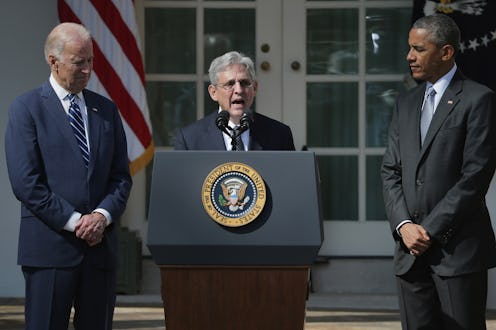News
Senate Republicans Refuse To Play Ball
Since the death of Supreme Court Justice Antonin Scalia early last month, the question of who will be nominated to fill the vacant seat has stirred up a lot of controversy. Senate Republicans have vowed to block anyone that Obama nominates, claiming that the position should not be filled during an election year. Late Wednesday morning, Obama spoke at the White House Rose Garden to officially nominate Merrick Garland, who currently serves as the chief judge of the D.C. Circuit Court of Appeals. Now that the president has made his nomination for Garland, when will the Senate consider Merrick Garland?
Garland spoke to the attendees of the event stating, "a life of public service is as much a gift to the person who serves as it is to those he is serving. And for me, there could be no higher public service than serving as a member of the United States Supreme Court." Now that the formal nomination has been declared, the process is pretty straightforward moving ahead, assuming all involved parties agree to cooperate. The next steps in the process include the confirmation of the nominee before the Senate Judiciary Committee, and a Senate floor vote — the date to be determined by Senate Majority Leader, Republican Mitch McConnell. However, McConnell made it clear in February that "this vacancy should not be filled until we have a new president."
Even so, the next step in the nomination process would be a confirmation by the Senate Judiciary Committee. The committee is made up of 11 Republicans and nine Democrats who will hold hearings to discuss the nominee, after which a vote will be taken. Afterwards, the nomination will open up to the full Senate. Because the current Senate is mostly Republican, odds are even a candidate like Garland — with a history of bipartisan support — will likely face a tough fight.
If the nomination makes it to the full Senate, that timeframe is completely up to Senate Majority Leader Mitch McConnell and there is no limit as to how long debating the candidate will and can go on for. Even though the confirmation of the appointee to the Supreme Court depends on the Senate's decision, Obama has the option to appoint a candidate temporarily to fill the vacancy without Senate approval. If this were the case, it is likely that a candidate would fill the vacancy until November when the next president is elected, in which case — assuming the presidency lands in the hands of another Democratic candidate — the next Justice could end up being even more liberal than Garland.
Maybe it's time Republicans just cut their losses and compromise?
